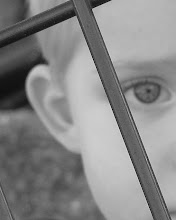We spent last evening with my parents.
I want to begin by saying I love them very much. They are wonderful parents in many ways, and I know I can attribute many of my successes to their guidance and teaching.
However, some of their views concerning discipline differ from mine.
I'm sure it's mostly a generational based difference. They were "old school". Meaning, their philosophy was mainly "children should be seen and not heard". A "good" child was quiet, one who did what they were told with no questions asked. Exercising one's right to say no was absolutely not tolerated. My father was very much an authoritarian figure in my life while growing up; it was his way, or the highway. You get the picture.
While they have relaxed somewhat over the years, anytime a grandchild shows some spunk, throws a tantrum, or doesn't automatically do what they are told, my parents classify them as "spoiled".
Of course, it's their parents' fault for not being able to "control" them.
This view does not work well when dealing with a child who has an autism spectrum disorder.
A child with autistic tendencies will NOT automatically do what they are told. Their brains function differently than than ours, and their behavior is often dictated by their state of regulation. Traditional discipline does not always work and is often not appropriate when they are disregulated.
Well Little Guy was in fine, disregulated form yesterday at my parents' house.
He wouldn't touch his dinner - it was absolutely delicious, but very threatening from a sensory point of view with its bright colors and mixed textures. Instead, he started screaming "NO,NO,NO!" and running around the house while the rest of us were trying to eat. When I picked up Little Guy to bring him back into the kitchen, he started screaming even louder and thrashed around violently in my arms.
After I finally got him calmed down enough to eat some yogurt (one of the few things I know he will eat), some of our cousins came over visit Grandma and Grandpa. Things got pretty noisy - and Little Guy is sensitive to loud sounds. His toleration level grew so low that every time his one-year-old cousin tried to approach him or even looked at him, Little Guy would start screaming.
Little Guy and I ended up spending the rest of the visit outside. He usually does fairly well outdoors; it seems to have a calming influence on him.
By the time we needed to go, he was regulated enough to go inside and say goodbye to my parents. On parting, my mother jokingly commented on what a little "pistol" I had on my hands.
That comment did not sit well with me. Little Guy is NOT a "pistol". He is NOT spoiled. He has neurological differences that make it more difficult for him to process and handle certain things.
This post is not meant to be a passive-aggressive means for me to handle this type of situation; I've talked with my mother before about Little Guy and the basis behind his perceived "misbehavior". I know she will become more understanding; it just takes time to redirect a lifetime of certain views and ways of thinking.
My hope is that this post will help at least one person to stop and reconsider next time they're about to make a snap judgement.
We are all guilty of this. In fact, I caught my husband doing it just the other day. He had spent the afternoon with an out-of-town friend who happened to have their seven-year-old son tagging along, and he was frustrated by the child's disruptive behavior. As he proceeded to describe what a little "terror" this boy was, I gently reminded him of our own child and how some people could view his behavior as "naughty" when it is actually being directed by his special needs. Who knows; this other child might have a similar diagnosis or something else that affected his behavior.
My husband grew quiet and said, "I didn't stop to think about that."
So next time you find yourself in that situation, I challenge you to "stop and think".
Because you never really know what the underlying circumstances might be.
Monday, May 4, 2009
Subscribe to:
Post Comments (Atom)


No comments:
Post a Comment